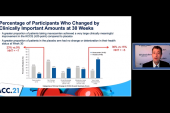FDA Approves Mavacamten for Obstructive Hypertrophic Cardiomyopathy
The drug is an allosteric inhibitor of myosin that carries a boxed warning about the potential risk of HF in some patients.

The US Food and Drug Administration has approved mavacamten (Camzyos) for the treatment of symptomatic obstructive hypertrophic cardiomyopathy (HCM), Bristol Myers Squibb announced yesterday.
Mavacamten, an allosteric inhibitor of cardiac myosin, is indicated for adults with NYHA class II or III obstructive HCM to improve functional capacity and symptoms based on the EXPLORER-HCM trial. As reported by TCTMD, significantly more patients in the trial who received mavacamten met the primary endpoint, defined by gains in peak V02 and improvement or stabilization of NYHA functional class, compared with those treated with placebo.
The EXPLORER-HCM long-term extension study, which was presented at the American College of Cardiology Scientific Sessions earlier this month, showed that those benefits were durable out to almost 1 year. Other analyses showed that mavacamten was associated with large improvements in patient-reported quality of life. In the VALOR-HCM trial, adding mavacamten to maximally tolerated medical therapy reduced the need for surgical or interventional septal reduction.
Iacopo Olivotto, MD (Azienda Ospedaliera-Universitaria Careggi, Florence, Italy), who led EXPLORER-HCM, said previously that mavacamten is targeted therapy that modifies the natural history of disease as opposed to older agents that were unable to address molecular defects of HCM. These older agents, such as beta blockers, non-dihydropyridine calcium channel blockers, and disopyramide, were often insufficient to resolve symptoms or had side effects for patients.
The approval is the first for a cardiac myosin inhibitor in the United States. Mavacamten will be available through the restricted Risk Evaluation and Mitigation Strategy (REMS) program and includes a boxed warning about the potential risk for heart failure in treated patients. The drug reduces left ventricular ejection fraction—7% of patients treated with mavacamten in EXPLORER-HCM experienced LVEF reductions to less than 50%—so echocardiographic assessment of LVEF will be required prior to and during treatment, according to the boxed warning. Starting the drug in patients with LVEF < 55% is not recommended.
Additionally, mavacamten is contraindicated in patients treated with moderate-to-strong CYP2C19 inhibitors or strong CYP3A4 inhibitors and moderate-to-strong CYP2C19 inducers or moderate-to-strong CYP3A4 inducers. These cytochrome P450 inhibitors or inducers may increase the risk of heart failure when used concomitantly with mavacamten.
Michael O’Riordan is the Managing Editor for TCTMD. He completed his undergraduate degrees at Queen’s University in Kingston, ON, and…
Read Full Bio




Comments